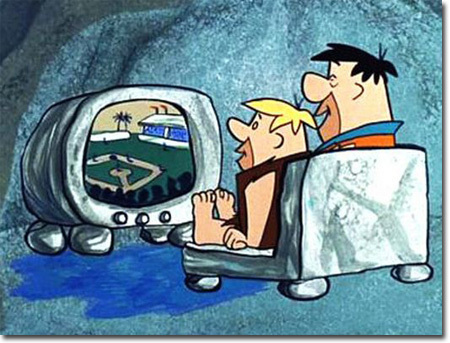Why The Flintstones Takes Place in a Post-Apocalyptic Future

For many of us, The Flintstones were our go-to source of facts and information about the Stone Age. But could it be that this beloved cartoon classic isn't an accurate depiction of the Stone Age at all? Could it, in fact, be set in a post-apocalyptic future wasteland that's been "bombed back to the Stone Age" for real? Let's investigate.
In the 1987 TV movie The Jetsons Meet the Flintstones, Elroy makes a time machine to send the family to the future. Chaos ensues when, thanks to a last second malfunction, they end up in the past. But, what if the machine worked? What if they actually just went to a future beyond their understanding?

We've already mentioned how the Jetsons live in the sky to escape the wasteland below. What if the wasteland was a nuclear apocalypse and Orbit City was only a temporary home away from home while the Earth recovered?
(NOTE: So it turns out that Chris Hardwick explained a very similar theory a few years ago on this live episode of the wonderful Nerdist Podcast. Skip to 1:17:20 to hear his version, which includes robots cloning dinosaurs, and is therefore scientifically superior to ours.)
In this scenario, surviving animals get a fresh start on an irradiated planet. Without humans constantly all up in their shit, animals would be free to evolve. Some would gain intelligence, or in the case of dinosaurs, a second lease on life. When humans finally came back down to Earth, they'd face an interesting dilemma. While technological advancements had made life easier, the cost was too damn high. The solution: a weird, nature-based hybrid. Why use motors on cars when humans could be engineered to be strong enough to propel them with their feet? Why use energy-guzzling machines when you could provide jobs, and a way to contribute to society, to the newly evolved animal population?
One of the most enduring charms of The Flintstones is the outdated, animal-driven technology. Instead of a garbage disposal, a pig sits under the sink. They pedal their cars and use a bird's beak to play records.

Suddenly, what we've long taken as a mere series of jokes about a primitive family having access to modern technology now seems like something more grim. Those bird beak record players and dinosaur powered factories are just the sad remnants of a world that used to be. A simple case of using what you have around to rebuild what once was.

Don't ask us to explain how those televisions work.
They even celebrate Christmas. That's a little bit deeper than just having boxes that they put food in to heat it up.

They're literally celebrating the birth of Christ on a show that, as far as we've always believed, takes place prior to the birth of Christ.
And to buy all of those Christmas presents, they have a pretty sophisticated economy. Unlike most primitive societies, the Flintstones don't operate on a barter system. They use actual money and have a seemingly complicated banking system. How complicated? Well, you apparently have to fill out deposit slips using a chisel. That seems pretty labor intensive.

Imagine being stuck in line behind that shit.
In addition, their money looks strangely contemporary, which is to say it looks like it belongs at the heart of a mystic-secret-society-is-ruling-the-world conspiracy theory.

The means to produce ink may not have survived the apocalypse that turned back the hands of time, but clearly stacks and stacks of paper money did. Using that as a tool to put together some semblance of an economy beats burning $100 bills in dumpsters to keep the roving hordes of hobos that accompany any apocalyptic scenario warm.
So far, we're talking about a supposedly prehistorical society that is perfectly capable of creating modified 20th century technology and a modern banking system. If we discovered a primitive society with the same characteristics today, we'd suspect they weren't primitive at all -- that they'd either been influenced by the outside world or were rebuilding from an earlier grandeur. Especially if they only listened to '50s-style rock and roll, sometimes pretty clearly inspired by the Beatles or the Beach Boys.

Remember, The Flintstones originally aired from 1960 to 1966, at the height of the Cold War. What if a nuclear showdown between the Soviets and Americans was what blew Bedrock to kingdom come? What if the Flintstones are us in the future, clinging to the best of our past as we rebuild? The familiar technology, entertainment and religion are all that remain from the fractured memories of a shattered history that never was. The Flintstones are living a life that's half The Matrix and half the ending of Wall-E, in a brave old world.